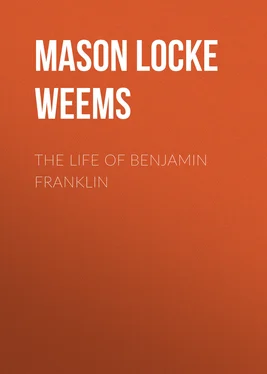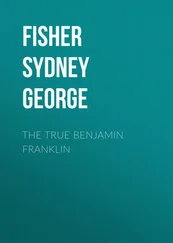Mason Locke Weems - The Life of Benjamin Franklin
Здесь есть возможность читать онлайн «Mason Locke Weems - The Life of Benjamin Franklin» — ознакомительный отрывок электронной книги совершенно бесплатно, а после прочтения отрывка купить полную версию. В некоторых случаях можно слушать аудио, скачать через торрент в формате fb2 и присутствует краткое содержание. Жанр: Биографии и Мемуары, История, foreign_edu, foreign_antique, foreign_prose, на английском языке. Описание произведения, (предисловие) а так же отзывы посетителей доступны на портале библиотеки ЛибКат.
- Название:The Life of Benjamin Franklin
- Автор:
- Жанр:
- Год:неизвестен
- ISBN:нет данных
- Рейтинг книги:5 / 5. Голосов: 1
-
Избранное:Добавить в избранное
- Отзывы:
-
Ваша оценка:
- 100
- 1
- 2
- 3
- 4
- 5
The Life of Benjamin Franklin: краткое содержание, описание и аннотация
Предлагаем к чтению аннотацию, описание, краткое содержание или предисловие (зависит от того, что написал сам автор книги «The Life of Benjamin Franklin»). Если вы не нашли необходимую информацию о книге — напишите в комментариях, мы постараемся отыскать её.
The Life of Benjamin Franklin — читать онлайн ознакомительный отрывок
Ниже представлен текст книги, разбитый по страницам. Система сохранения места последней прочитанной страницы, позволяет с удобством читать онлайн бесплатно книгу «The Life of Benjamin Franklin», без необходимости каждый раз заново искать на чём Вы остановились. Поставьте закладку, и сможете в любой момент перейти на страницу, на которой закончили чтение.
Интервал:
Закладка:
In like manner, it was on the simple regimen of vegetables and water, the easy purchase of three cents a day, that the same Providence raised up our young countryman to guard the last spark of perfect liberty in the British colonies of North America. Yes, it was on three cents' worth of daily bread and water, that young Ben Franklin commenced his collection of that blaze of light, which early as 1754, showed the infant and unsuspecting colonies their rights and their dangers—and which afterwards, in 1764, blasted the treasonable stamp act—and finally, in '73 and '74, served as the famed star of the East, to guide Washington and his wise men of the revolution, to the cradle of liberty, struggling in the gripe of the British Herod, lord North. There rose the battle of God for an injured people; there spread the star-spangled banner of freedom; and there poured the blood of the brave, fighting for the rights of man under the last republic. O that God may long preserve this precious vine of his own right hand planting, for his own glory and the happiness of unborn millions!
But the reader must not conclude that Ben, through life, tied himself up to a vegetable diet. No. Nature will have her way. And having designed man partly carnivorous, as his canine teeth, his lengthened bowels, and his flesh-pot appetites all evince, she will bring him back to the healthy mixture of animal food with vegetable, or punish his obstinacy with diarrhœa and debility. But she had no great difficulty in bringing Ben back to the use of animal food. According to his own account, no nosegay was ever more fragrant to his olfactories than was the smell of fresh fish in the frying pan. And as to his objection to such a savory diet on account of its stupifying effects on the brain, he easily got the better of that, when he reflected that the witty queen Elizabeth breakfasted on beef-stake; that sir Isaac Newton dined on pheasants; that Horace supped on fat bacon; and that Pope both breakfasted, dined, and supped on shrimps and oysters. And for the objection taken from the cruelty of killing innocent animals, for their flesh, he got over that by the following curious accident:—On his first voyage to New-York, the vessel halting on the coast for lack of breeze, the sailors all fell to fishing for cod, of which they presently took great numbers and very fine. Instead of being delighted at this sight, Ben appeared much hurt, and began to preach to the crew on their "injustice," as he called it, in thus taking away the lives of those poor little fish, who, " had never injured them, nor ever could ." The sailors were utterly dum-founded at such queer logic as this. Taking their silence for conviction, Ben rose in his argument, and began to play the orator quite outrageously on the main deck. At length an old wag of a boatswain, who had at first been struck somewhat aback by the strangeness of this attack, took courage, and luffing up again, with a fine breeze of humour in his weather-beaten sail, called out to Ben, " Well, but my young Master preacher, may not we deal by these same cod here, as they deal by their neighbours. "
"To be sure," said Ben.
"Well then, sir, see here," replied the boatswain, holding up a stout fish, "see here what a whaler I took just now out o' the belly of that cod!" Ben looking as if he had his doubts, the boatswain went on, "O sir, if you come to that, you shall have proof ;" whereupon he laid hold of a large big-bellied cod that was just then flouncing on the deck, and ripping him open, in the presence of Ben and the crew, turned out several young cod from his maw.
Here, Ben, well pleased with this discovery, cried out, Oho! villains! is that the game you play with one another under the water! Unnatural wretches! What! eat one another! Well then, if a cod can eat his own brother, I see no reason in nature why man may not eat him. With that he seized a stout young fish just fresh from his native brine, and frying him in all haste, made a very hearty meal. Ben never after this, made any more scruples about animal food, but ate fish, flesh, or fowl, as they came in his way, without asking any questions for conscience sake.
CHAPTER XI
Except the admirable Crichton, I have never heard of a genius that was fitted to shine in every art and science. Even Newton was dull in languages; and Pope used to say of himself, that "he had as leave hear the squeal of pigs in a gate, as hear the organ of Handel!" Neither was our Ben the " omnis homo " or " Jack of all trades ." He never could bear the mathematics! and even arithmetic presented to him no attractions at all. Not that he was not capable of it; for, happening about this time, still in his sixteenth year, to be laughed at for his ignorance in the art of calculation, he went and got himself a copy of old Cocker's Arithmetic, one of the toughest in those days, and went through it by himself with great ease. The truth is, his mind was at this time entirely absorbed in the ambition to be a finished writer of the English language; such a one, if possible, as the Spectator, whom he admired above all others.
While labouring, as we have seen, to improve his style, he laid his hands on all the English Grammars he could hear of. Among the number was a treatise of that sort, an old shabby looking thing, which the owner, marking his curiosity in those matters, made him a present of. Ben hardly returned him a thankee, as doubting at first whether it was worth carrying home. But how great was his surprise, when coming towards the close of it, he found, crammed into a small chapter, a treatise on the art of disputation, after the manner of Socrates. The treatise was very short, but it was enough for Ben; it gave an outline, and that was all he wanted. As the little whortle-berry boy, on the sands of Cape May, grabbling for his breakfast in a turtle's nest, if he but reaches with his little hand but one egg, instantly laughs with joy, as well knowing that all the rest will follow, like beads on a string. So it was with the eager mind of Ben, when he first struck on this plan of Socratic disputation. In an instant his thoughts ran through all the threads and meshes of the wondrous net; and he could not help laughing in his sleeve, to think what a fine puzzling cap he should soon weave for the frightened heads of Collins, Adams, and all others who should pretend to dispute with him. But the use which he principally had in view to make of it, and which tickled his fancy most, was how completely he should now confound those ignorant and hypocritical ones in Boston, who were continually boring him about religion. Not that Ben ever took pleasure in confounding those who were honestly desirous of showing their religion by their good works ; for such were always his esteem and delight. But he could never away with those who neglected justice, mercy, and truth, and yet affected great familiarities with the Deity, from certain conceited wonders that Christ had wrought in them. As no youth ever more heartily desired the happiness of man and beast than Ben did, so none ever more seriously resented that the religion of love and good works tending to this, should be usurped by a harsh, barren puritanism, with her disfigured faces, whine and cant . This appeared to him like Dagon overturning the Ark of God with a vengeance. Burning with zeal against such detestable phariseeism he rejoiced in his Socratic logic as a new kind of weapon, which he hoped to employ with good effect against it. He studied his Socrates day and night, and particularly his admirable argumentations given by Xenophon, in his book, entitled "Memorable things of Socrates;" and in a little time came to wield his new artillery with great dexterity and success.
But in all his rencontres with the false christians, he adhered strictly to the spirit of Socrates, as being perfectly congenial to his own. Instead of blunt contradictions and positive assertions, he would put modest questions; and after obtaining of them concessions of which they did not foresee the consequences , he would involve them in difficulties and embarrassments, from which they could never extricate themselves. Had he possessed a vanity capable of being satisfied with the triumph of wit over dulness, he might long have crowed the master cock of this Socratic pit. But finding that his victories seldom produced any practical good; that they were acquired at a considerable expense of time, neglect of business, and injury of his temper, which was never formed for altercation with bigots, he abandoned it by degrees, retaining only the habit of expressing himself with a modest diffidence. And not only at that time, but ever afterwards through life, it was remarked of him, that in argument he rarely used the words certainly , undoubtedly , or any others that might convey the idea of being obstinately conceited of his own opinion. His ordinary phrases were— I imagine — I suppose- -or, it appears to me, that such a thing is so and so —or, it is so, if I am not mistaken . By such soothing arts he gradually conciliated the good will of his opponents, and almost always succeeded in bringing them over to his wishes. Hence he used to say, it was great pity that sensible and well-meaning persons should lessen their own usefulness by a positive and presumptuous way of talking, which only serves to provoke opposition from the passionate, and shyness from the prudent, who rather than get into a dispute with such self-conceited characters, will hold their peace, and let them go on in their errors. In short, if you wish to answer one of the noblest ends for which tongues were given to rational beings, which is to inform or to be informed , to please and to persuade them, for heaven's sake, treat their opinions, even though erroneous, with great politeness.
Читать дальшеИнтервал:
Закладка:
Похожие книги на «The Life of Benjamin Franklin»
Представляем Вашему вниманию похожие книги на «The Life of Benjamin Franklin» списком для выбора. Мы отобрали схожую по названию и смыслу литературу в надежде предоставить читателям больше вариантов отыскать новые, интересные, ещё непрочитанные произведения.
Обсуждение, отзывы о книге «The Life of Benjamin Franklin» и просто собственные мнения читателей. Оставьте ваши комментарии, напишите, что Вы думаете о произведении, его смысле или главных героях. Укажите что конкретно понравилось, а что нет, и почему Вы так считаете.









![Benjamin Franklin - Memoirs of Benjamin Franklin; Written by Himself. [Vol. 2 of 2]](/books/747975/benjamin-franklin-memoirs-of-benjamin-franklin-wr-thumb.webp)
![Benjamin Franklin - Memoirs of Benjamin Franklin; Written by Himself. [Vol. 1 of 2]](/books/748053/benjamin-franklin-memoirs-of-benjamin-franklin-wr-thumb.webp)

